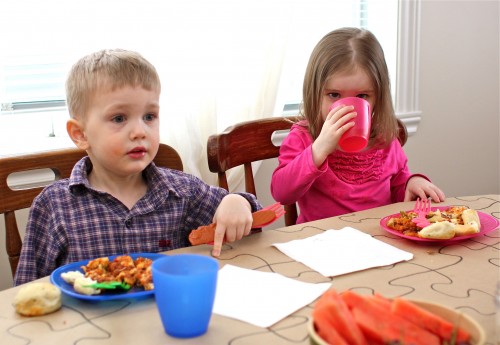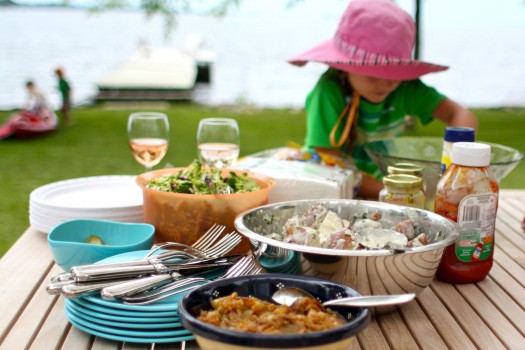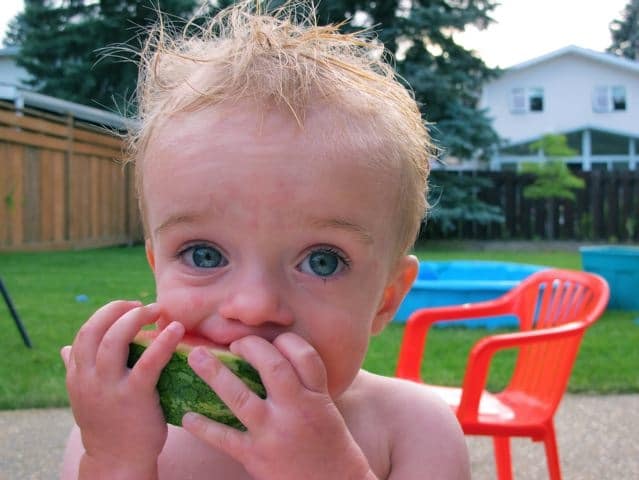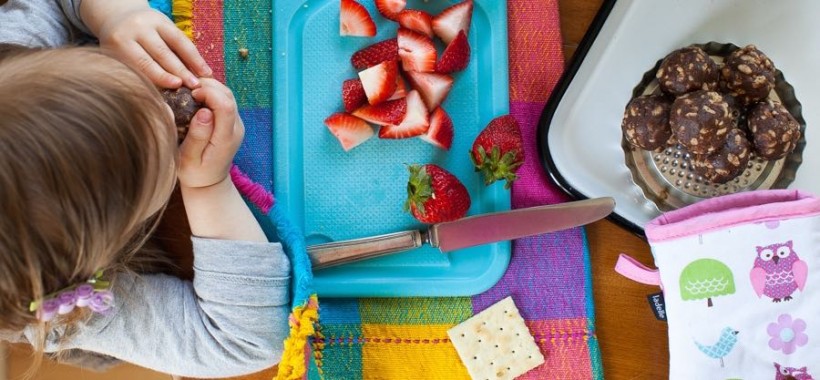Why (and How) You Should Create a Healthy Food Culture for Your Family
Food is a celebration of both life and family. Food is also a culture, and it is up to you to shape that culture in your home and around your table.
Italians are famous for their food culture; their recipes are handed down from generation to generation and children cook alongside their nonnas, who express their love to their family in a dish. Yes, the strong food heritage of Italians is noted, but we all have a food culture of our own, whether it is as obvious as a plate of homemade eggplant parmigiana or not.
How do you relate to food? What are your childhood experiences? These are the things that shape your personal food culture. It is more than ethnicity or heritage, it is your attitude toward food.
Food culture is passed along from parents to children, and shaped by day-to-day actions, expressions, and words.
Why Is Food Culture Important Today?
We know that sharing a meal together is more than just physically nourishing, but it fills a primary need for community and connection on many levels. By creating a healthy food culture in the home, you are giving your children the very best attitude toward food, instead of letting society’s food culture influence – and perhaps misguide – them,
We want our children to grow up to be healthy eaters, aware of the way their food choices affect the planet, and how it is produced. Most importantly, we want them to connect the dots between healthy, whole food and happiness.
My Family’s Food Culture
As this post started to take shape in my mind, I couldn’t help but notice how the strong food culture that my siblings and I were immersed in as children still affects us today. Nearly thirty years later, all four of us are following in the footsteps of our parents in some way or another, even though we live in a modern world and our lifestyles are very different.
As a boy, my brother, Josh, fished for lake trout from the lake that we lived on. Now he takes his family deep sea fishing for halibut and crabs, digs for clams, and wrestles 35 pound Steelhead salmon from the riverbed every August.
Eldest of us three girls, my sister Haidi milks goats for a neighbor and trades her efforts for fresh milk. She makes her own yogurt, just as my mother used to from our goats. Although Haidi lives in a different country, and in a city as opposed to our rural upbringing, her three children are surrounded by a very similar food culture that Haidi was raised in. (Note: our surroundings affect our food culture marginally compared to our attitudes.)
Miranda, the youngest of the four, never ate the way most college students do. She cooked from scratch and embraced real foods similar to those she grew up on. Now she even prepares her pet food from scratch – for three dogs and two cats. No additives for anyone!
My mother was (and still is) a gardener through and through. I’ve carried on that aspect of our food culture to the best of my ability and circumstances. I think I’m happiest when I have dirt under my fingernails and nothing tastes as good as home grown vegetables.
What is my point? It’s no coincidence that the activities and interests that my siblings and I currently embrace are reflections of our upbringing.
How to Create a Healthy Food Culture at Home
Children mirror what they see in us. Your attitude toward food -buying, cooking, eating- will directly shape how your children approach it.
Talk
Actions speak louder than words, but never underestimate the impact of a solid conversation. Topics such as seasonal eating, sustainable farming, and whole foods can be introduced to children in ways they can understand. It’s never too early to plant the seeds of environmental responsibility.
My kids and I talk through food shopping, cooking, and eating. When my two-year-old announces he’s finished eating his brassicas, it’s because he’s been listening in on his older brother’s conversation with me about the genus species of vegetables on his plate.
Grow
You can help your children make that key connection between field and fork by growing some produce yourself. Also, what better way to explain seasonal eating than by observing it first-hand as the seasons change?
If growing some of your own food isn’t possible, then visit a farm once in a while.
Shop
I can’t remember ever setting foot in a grocery store with my mother. What I DO remember vividly, however, are the farmers markets we frequented on Saturday mornings. I can recall the taste of a brownie I nibbled as we walked along the stalls, the feel of a baby rabbit’s silken fur under my fingertips, the sound of the rain pattering on the tarped stalls, and the smells of tomato seedlings, waving at me from their peat moss cups.
Food culture. It’s not surprising that now I feel out of place in a supermarket, but at home at the open air marché.
You probably already shop with a little one or two in tow, so why not make it memorable (and informative)? Food culture starts with gathering the food, no matter where you shop.
Cook
I’ve long sung the praises of having kids in the kitchen. The effects of this nurturing, one-on-one time are life-long. Where else are children going to learn about their family’s food culture than under your wing in the heart of the home? By touching the food, talking about it, and watching it come alive under your hands, they are learning to appreciate whole foods and the enjoyment of scratch cooking.
Related posts:
- 6 Ways to Thrive in The Kitchen With the Kids :: my article on Simple Mom
- Simple Tips for Baking with Kids
Eat
Eat together. This is Food Culture 101. I don’t need to elaborate on the importance of the family dinner. What I would like to point out, though, is that eating together doesn’t have to be static and predictable.
Round out the corners of your home food culture by showing that food can be an adventure, an experience, a journey or a collaboration. I’m all for manners, but if they portray eating as a sterile, no-nonsense action, then it’s time to relax and have some fun.
Campfires, fondue, dinner baked in foil, picnics, family pizza night, and sweet summer corn on the cob are just but a few ways to ignore the silverware and enjoy food from a different angle.
It is up to the parents to demonstrate that fun is indeed fun.
Pray
Saying grace and giving thanks to God is an integral part of our food culture. Around our table we bless the food and the one who prepared it, express thankfulness for the bounty of it and His provision for it, and show appreciation for the Creator who nurtured the seeds.
Even if you don’t pray in your home, take time to acknowledging that you have food when so many do not, and you will teach your children gratefulness in a day when so much is taken for granted.
How would you describe the food culture in your home? Would you like to strengthen it?










I can certainly see this at play from both branches of our family tree.
My husband grew up in a family that loves to cook, often cooks together, and really enjoys family meals. He does the majority of our cooking today and is really the main force in getting the entire family in the kitchen together, cooking and eating.
I grew up in a family where fresh food, gardening, and growing our own food was very important. That has become a part of the fabric of our lives, and we’ve always had some sort of garden no matter where we’ve lived – containers on a city apartment patio to our simple backyard raised bed.
Love this post, Aimee! Really interesting things to think about and reflect on 🙂
Thanks for sharing, Kara. It sounds like you and Chris have things really well balanced out. Love that preparing meals is a family affair.
UM, hello!! THis post is amazing!! I could not agree more… and I LOVE that you added prayer!! Bless you sweet girl!
Food was always at the center of daily life on my mother’s side of the family. We would shop together, garden together, pick wild fruits together and cook together. I think that it was growing up in this environment where I was so connected to where my food came from that really helped to shape my love and appreciation for food and cooking.
Your mother’s efforts and dedication certainly paid off, Sylvie. You’re an inspiration to so many now!
Such an interesting and lovely post, Aimee. I come from the opposite side of the fence. I was raised by very non-granola hippies who were completely smitten with the idea of NOT having to grow/raise their own foods (as was done in their childhood) and who loved the idea of purchasing everything pre-made from the supermarket.
When I left home and went to University I was so shocked by the idea of homegrown/homemade foods, gardening and farmer’s markets. I fell in love with all of it. My husband came from the opposite upbringing, and now we’re raising our kids more like how he grew up. We’re motivated to have the same things for completely different reasons.
That’s awesome that your husband and you see eye-to-eye, Jan. Obviously, from your writing, you’re passing down that same motivation to your kids. Keep it up!
I really enjoyed this post. I so desire this for my family but I’m not sure where to start. I grew up in a single parent household where food was picked up from a drive thru or thrown together quickly and with little thought. Now a mom of three little ones, 5, 3, and 6 months, I want to cultivate healthy & happy memories and good habits for a lifetime. Thanks.
Hi Alicia,
Thanks for sharing where your family is at right now. You must be busy with those three little ones!
I think you already have the most important key to getting started, and that is the desire for healthy food culture.
Are any of the six steps suggested in the post feasible for you right now? Perhaps you could start with small changes for shopping that would interest your two older children. A visit to a market where they could each choose a fruit and a vegetable could be fun. Or even better, try to schedule a trip to a farm (in spring of course!). I like to go with a girlfriend and kids and make it an outing.
Have fun and feel free to ask questions!
Beautiful post, Aimee. You are so lucky to grow up in such a nuturing environment and it looks like you have passed that onto your kids.
Thanks for the tips! Great ideas on how to encourage a food culture in a family.
This is wonderful and so true. When we have kids, I can’t wait to teach them about gardening and cook with them.
I loved the personal touch behind this post, Aimee. I would love to see more “my food culture” posts similar to what Jamie has been doing with “a day in the homeschooling life”.
I like what you said about everyone having a food culture – whether we mean to or not. And I always say that the most important thing anyone and everyone should do for their health is to just cook and learn how to use raw ingredients. Once you know what to do without food without a label you know how to eat healthy.
That could be a really great series, Shannon. I have to admit, I almost interviewed you and a few other for this post..but it was getting really long! Apparently, I’ve got a lot to say on the topic. 🙂
I’m going to give it some thought, for sure. I love the idea of inspiration, but wouldn’t want it to be ‘preachy’, you know? Each family (like each child) is so unique; what works for one may not be a template for another.
I love that idea! To Aimee’s point, we all do have such different approaches and I truly enjoy (and learn from) hearing how other families approach food. When shared from “my perspective”, I don’t think it’s preachy at all.
Lovely post. I could not agree more. We often tease my youngest son that he is a picky eater because he is more picky than my 2 other boys. But hen compared to most children I know, he is not a picky eater at all.
Most other children I know have no concept of where their food comes from or how it was prepared. We introduce our kids to many foods, ways of eating them and make sure they understand where they come from. In doing so, we not only teach them about food, but how the world at large is connected.
I truely believe that simply understanding food and how it connects us in so many ways will make them more aware and empathetic as adults. For now, there really is nothing more fun than when one of my boys asked to make sushi for his birthday or how all three of them will dive on the bag from the CSA to dig out a treat of a fresh apple or a handful of grapes.
Well said, Hanna. Children who are know where their food comes from will grow up to be teens who are aware of the ocean crisis, GM foods, pesticide prevalence, and so many other food relates issues today.
Our family food culture doesn’t relate at all to mine growing up. I was raised by a single mom on food that was the cheapest (bulk potatoes, tuna noodle casserole with Campbells soup, mac and cheese, multi-colored breakfast cereal), plus frozen veggies and milk thrown in to keep me healthy.
Ever since I left the house, I’ve been on a journey to learn everything I could about organic gardening, preserving, cooking delicious meals from scratch, nutrition and foods in general. I’ve loved learning it all and now love passing it on to my kids, who definitely embrace the food culture we’ve created as a family. 🙂
That is fantastic, Alicia. Sounds like your very own incredible journey.
Love, love this post, Aimee!! Hubby and I are fortunate to both come from families who truly love cooking and the process of cooking. We now have two baby girls of our own, and I am just a sponge for all things food-related; placing focus on creating a food culture is right up my alley! Your posts are always so insightful, practical and inspiring! And I so love that you added in prayer; beautiful. Our two year old loves “saying grace” before meals.
Your little family sounds like the perfect recipe for healthy food culture. Way to pass along your ideals to the kids!
I have actually been frustrated about this very thing lately. My husband and I model healthy eating for the kids – we make (mostly) wise eating choices, and we load up on fresh produce at every meal. I involve the kids in gardening, food shopping and preparation, and do most of the things you suggest above. We eat dinner as a family most nights, and our meals are healthy, homemade, and very inviting. But my big kids (ages 11 and 8) have become so picky about eating fruits and veggies. My daughter eats tomatoes and apples, but that’s the only produce she’ll eat. My son eats olives, pickles, and grapes. I am frustrated and at somewhat of a loss. If you have any suggestions, I would certainly welcome them!
What’s a mom to do, right? Rivki, I don’t have any answers for older kids, but here’s an excellent post that caught my eye this week: https://foodformyfamily.com/the-kitchen-sink/picky-eaters-guest-post-picky-teens-and-tweens-whats-a-mom-to-do
I hope that help. Keep the faith!
That link is really interesting, actually. Thanks so much for sharing. It’s just a whole different set of strategies with the older kids. Things sure do get more complicated as they grow up!
I grew up on a farm in SD, with a very strong food culture. Mom has always cooked and baked from scratch. And we had a very large vegetable garden, a raspberry patch, and a number of apple and pear trees. Mom taught my sisters and I how to aptly navigate the kitchen and to appreciate homegrown goodness. I’m passing all of this along to my girls, as well, even though our garden is alot smaller! And, like the families we grew up in, my husband & I are always thankful for the blessings we have, and we pray before eating. Great post, Aimee.
Fantastic, Brenda! I’m sure your girls love to hear about ‘farm life’. 🙂
Hi Aimee, This is a lovely article! It is so true too. My mother cooked traditionally and as a child, I loved the food, but craved the junk my friends had. Now I also cook mostly traditionally and intuitively and my kids LOVE it. All my brother’s and sisters love to cook and it is all the old recipes we clamor for! Family and food is the center of life! All the best, Alex@amoderatelife
Thanks for sharing, Alex. I’ve got an old, old cookbook of my mothers that I treasure, so I know exactly what you mean!
Thanks a lot for sharing this post, Aimee! I’ve been interested in the concept of sustainable eating culture for a while now and I never really connected it with a family’s culture of food before. Your point about involving children in the kitchen takes me back to my mother’s kitchen where she would involve us in little tasks like chopping vegetables or preparing dough. I realize now that my positive relationship with cooking and food dates back to those days.
I’m actively in the process of creating a food culture for my family, and although my own family-of-origin’s version is pretty thin due to two more-than-full-time working parents, I am determined to do it differently now. “Nourishing Traditions” by Sally Fallon seems to have been the turning point for me, in understanding the origins of my food culture and how to bring it to life in the kitchen day by day. I love this article and will be sharing it – it’s such an important concept and I love that it’s being put into practice. There’s a revolution happening, a reclaiming of kitchen wisdom after a generation and a half of losing it to the two-income family. Let’s bring it back!
Maggie, I have heard such good things about NT; I’m glad it has had such a positive impact on your family food culture. Thanks for sharing this article, I hope it inspires others think on our food values and culture.
Oh Aimee, we are of kindred spirits. I really connected with your story about our food culture. It sounds like we’re creating very similar food cultures in each of our family’s – so many miles apart.
Part of my motivation is that I want my children to spend time in the kitchen with family recipes and traditions of my youth – making pizza, baking bread, cooking our favorite pasta sauce. I grew up in a fairly rural suburb that included a lot of horse property but not farms, which may be why it’s so important to me for my children to grow up in an agricultural area. We’re minutes from farms big and small that we visit throughout the growing season to pick our own fruits and vegetables, and learn about growing them on a farm. We also grow our own food at home and the kids are involved at every stage. Cooking and family meals were part of my food culture growing up, but certainly not the growing of food so we make our own traditions. Just a few weeks ago, my 4 year old asked if we could look through our gardening books to plan our vegetable garden for the year.
You really touched my heart with this one, Aimee. Thank you. Sometimes we need the affirmation that we’re on the right track and doing the right things for our family.
{{Hugs}}
Gina, you’re on the right track, alright, and a huge inspiration to all of us. Thanks for your comment.
“our surroundings affect our food culture marginally compared to our attitudes”
More than that, even! I find that the influence of the food culture I grew up with grows even stronger as time goes on.
As a I’ve moved from the suburban midwest to small town southwest to the Big City, I’m even more likely to cook from scratch, shop daily for fresh ingredients and have long, side-splitting conversations with friends and family around the dinner table (long after dinner is put away).
THANKS for this post. I am always trying to think of ways to create a food culture in our home and certainly got some new ideas by reading this. My daughter LOVES to shop for food with me. I “melted” a few days ago when we drove by the site of our farmer’s market and she said, “Mommy, I wish the farmer’s market was open.” We shop at the grocery store, too, but it was obvious then that our trips to the farmer’s market have made an impression on her!
Very moving. Thanks for taking the time to put all of that down. Totally made my whole day. Cheers!
Wonderful article and so true! Great points!
Lovely and so worth remembering, Aimee!
Oh, I just love this post! I grew up in a family that always ate dinner together at the dinner table every evening… And, my mom prepared most of our food from scratch. My husband didn’t have that experience, but together we have really learned to love sitting down and eating together each evening. Now I am the one preparing food from scratch and doing my best to make sure we eat responsibly (fresh, local, sustainable). There’s always room for improvement, of course!
Aimee, this was just a beautiful post. It’s really amazing to see how involving your children and talking about food really makes an impact on their little lives. My eldest is just giddy to see his strawberry patch produce again and just yesterday was exclaiming how “delises” fish is. I love it and the culture we are instilling in him. Blessings lovely lady!!
Such fun! You know, my earliest gardening memories are of my own strawberry patch! It felt like it took aaaaages for them to ripen, but I was so proud when they did. Thanks for reading and for sharing your input.
I grew up in a household of contradictions. My parents gardened (but used chemicals to control pests) and my mom always cooked from scratch (except for things like pudding and boxed cake mixes). My own kids have grown up with me gardening (organically) and cooking from scratch (including pudding and recently, even cakes!). They know that our household isn’t the norm, though. They see their friends eating processed cheese and bologna, and thank me for cooking for them. I’ve told them that they may have trouble finding a partner in life who subscribes to the same food values. I’m happy to see that so many people are at least realizing that our food culture needs a face lift. Maybe there’s hope?
Kris, there is always hope! The more we talk about the importance of food culture and values, the more people will seek answers. Thanks for sharing a bit of your journey; it sounds like you have a good recipe for healthy family food culture.
Thanks for making me think about this. It’s implicit in our home, but I never stop to think about much.
One thing I think you are missing is the cultural aspect. It’s mentioned, but for many first generation Canadians like me, it is rampant. And it kills me that one of my kids won’t eat pyrohy.
What a great post Aimee! We have a strong plant-based eating, joyful-living food culture in our home. And sharing our table with others.
Aimee, this was so well put, and something that needed to be said in a society that is often too busy to eat together never mind eating mindfully. Culture refers to a way of living, and it requires living intentionally to teach our children not only to appreciate good food, but how to participate in the food experience. My seven-year old daughter now sets the table for dinner, and she and her brother help clear, and serve dessert (on those happy occasions). Having a daily part to play in the family dinner gives them a feeling of accomplishment and connection.
Really loved this post – makes so much sense and it’s so important for us to pass down these traditions and ways of life to our children. What better way than through our example!
Love this post! Sharing a food culture with our future children is one of the things I most look forward to. I can’t wait to have the kids with us in the garden, at the market, in the kitchen, and around the table!
This is such a great piece. I just wrote my own thoughts on this topic on my own blog. Travelling in Europe made the lack of food culture in the US especially apparent. Thanks for bringing this up and providing help in how to move in the right direction.
Hello Aimee! I’m so grateful for this post. I’m a senior in high school, and my school requires us to pass a senior project to graduate. In case you haven’t heard of senior projects, its a process that involves a research paper, a product, a portfolio, and a presentation. For my project, I want to prove how food is a major way to express culture and family. My teacher gave me this idea because she was encouraging our class to do a family tree. We began to talk about how family recipes are passed down. I knew I wanted to incorporate culture, family, and food all together but didn’t know how. Your post has inspired me. Do you have any advice that could help me? or perhaps ideas that could contribute to my research?
I really like this post.. You sure are a very happy family.. And I love the Big Crab! great post!
I would totally agree with you on all your points. It is so important to have these things ingrained into your family’s life. Food culture in families is so important. Today it is being lost or relinquished to the media. Families today care less about enjoying the art of cooking and eating. They care more about getting the chore of eating done and over with as quick as possible. Michael Pollan makes this point in his article “Out of the Kitchen, onto the Couch.” Pollan talks about how we have given up the art of cooking and would rather watch someone else cook then do it ourselves. Cooking can be such a time of enjoyment for the whole family. We need to get away from the mentality of eating just to eat and instead cook and eat because it is something which we can do with others. It is something we can get our family involved in. We need to take back the enjoyment of cooking and be able to pass this onto our children. Time in the kitchen or elsewhere cooking and eating should be an enjoyable time of learning and cherishing the food culture of our family.
This is a beautiful post. Thanks for encouraging families in this way.
Like a few others who have commented I also come from a family who had the opposite kind of food culture.
Food came out of a box from the freezer or cupboard. It wasn’t until I went to culinary school that I started meeting people who were raised with a family food culture that involved fresh foods cooked and eaten together.
Now my husband and I take our little one with us to the farmers’ market every week and she loves to stand beside me on a chair in the kitchen while I cook our local goodies.
I can already see a big difference in her attitude towards food compared to her cousin’s, my sister having stuck with our family’s old boxed food culture.